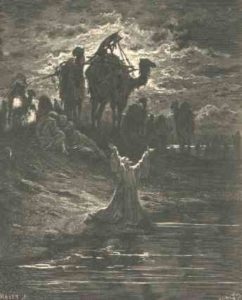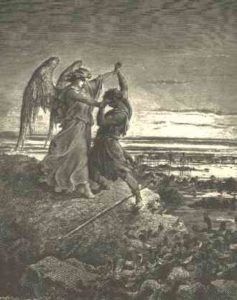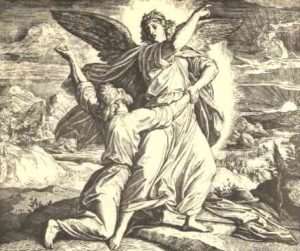Outline
Jacob’s vision at Mahanaim, His fear of Esau. (Verse 1-8.)
Jacob’s earnest prayer for deliverance, He prepares a present for Esau. (Verse 9-23.)
He wrestles with the Angel. (Verse 24-32.)
1 And Jacob went on his way, and the angels of God met him.
Mahanaim is the plural of Mahana which means Angel or messenger of God.
2 And when Jacob saw them, he said, This is God’s host: and he called the name of that place Mahanaim.
[Josh 5:14, Psa 103:21, Psa 148:2, Luke 2:13]
“Mahanaim” = Two camps
3 And Jacob sent messengers before him to Esau his brother unto the land of Seir, the country of Edom.
[Gen 33:14, Deut 2:5, Josh 24:4, Gen 25:30, Gen 36:8, Num 20:14, Judg 11:17, 2nd Sam 8:14]
4 And he commanded them, saying, Thus shall ye speak unto my lord Esau; Thy servant Jacob saith thus, I have sojourned with Laban, and stayed there until now:
5 And I have oxen, and asses, flocks, and menservants, and womenservants: and I have sent to tell my lord, that I may find grace in thy sight.
6 And the messengers returned to Jacob, saying, We came to thy brother Esau, and also he cometh to meet thee, and four hundred men with him.
7 Then Jacob was greatly afraid and distressed: and he divided the people that was with him, and the flocks, and herds, and the camels, into two bands;
[Gen 35:3, Psa 107:6]
8 And said, If Esau come to the one company, and smite it, then the other company which is left shall escape.
Jacob devises a plan that went over real well with Leah and his handmaids to save his own life and those he loved the most. This act of favortism no doubt left a mark in the minds of Joseph’s brothers and their mothers as to just how important they were in Jacob’s eyes.
9 And Jacob said, O God of my father Abraham, and God of my father Isaac, the LORD which saidst unto me, Return unto thy country, and to thy kindred, and I will deal well with thee:
[Gen 31:3]
“which saidst unto me…” – Jacob is claiming God’s promises in prayer; this sets a pattern seen throughout scripture of taking God at his word and making requests based upon what he has said. [II Sam. 7:25]

10 I am not worthy of the least of all the mercies, and of all the truth, which thou hast shewed unto thy servant; for with my staff I passed over this Jordan; and now I am become two bands.
11 Deliver me, I pray thee, from the hand of my brother, from the hand of Esau: for I fear him, lest he will come and smite me, and the mother with the children.
[Psa 59:1, Hosea 10:14]
12 And thou saidst, I will surely do thee good, and make thy seed as the sand of the sea, which cannot be numbered for multitude.
Jacob gets religious suddenly when he is in trouble and he starts to pray. If he would have prayed before devising his plan to meet and appease Esau he would have prevented a lot of future problems, like the Jealousy Joseph’s brothers had towards him.
13 And he lodged there that same night; and took of that which came to his hand a present for Esau his brother;
[Gen 43:11]
after this prayer Jacob demonstrates his lack of faith and takes matters into his own hands (v. 13-20) which later turns out to be an unnecessary step. How often do you pray and then immediately act upon the situation for which you prayed as though God was not going to answer? We must remember that “faith” is simply trusting God and this is the necessary ingredient of prayer.
14 Two hundred she goats, and twenty he goats, two hundred ewes, and twenty rams,
15 Thirty milch camels with their colts, forty kine, and ten bulls, twenty she asses, and ten foals.
“milch camels” – camels that give milk
16 And he delivered them into the hand of his servants, every drove by themselves; and said unto his servants, Pass over before me, and put a space betwixt drove and drove.
17 And he commanded the foremost, saying, When Esau my brother meeteth thee, and asketh thee, saying, Whose art thou? and whither goest thou? and whose are these before thee?
18 Then thou shalt say, They be thy servant Jacob’s; it is a present sent unto my lord Esau: and, behold, also he is behind us.
Wait a minute! Jacob is to be Esau’s lord, and Esau is to be Jacob’s servant according to their father’s own words. What is going on here? Jacob is trying to save his own skin by appeasing Esau. He could have said, Esau, it was wrong for me to take advantage of you.
He instead tries to appear to give back the birth-rite to his Brother. This was not his to give back for God had determined before they were ever born that the Elder should serve the younger.
19 And so commanded he the second, and the third, and all that followed the droves, saying, On this manner shall ye speak unto Esau, when ye find him.
20 And say ye moreover, Behold, thy servant Jacob is behind us. For he said, I will appease him with the present that goeth before me, and afterward I will see his face; peradventure he will accept of me.
[Prov 21:14]
21 So went the present over before him: and himself lodged that night in the company.
22 And he rose up that night, and took his two wives, and his two womenservants, and his eleven sons, and passed over the ford Jabbok.
[Deut 3:16]
23 And he took them, and sent them over the brook, and sent over that he had.
We are not sure why Jacob was led to stay back while his family was all in harm’s way. Maybe he felt they were safe for the evening and he would devote the evening to praying, something he didn’t do very often apparently.
24 And Jacob was left alone; and there wrestled a man with him until the breaking of the day.
“wrestled” – this was probably not a physical wrestling match as one angel could easily kill 185,000 men in one night in II Kings 19:35; Jacob was more than likely in prayer, begging God for deliverance from his brother Esau when an angel appeared to him; Jacob apparently grabbed a hold of this angel (v. 26) and refused to let go until he was blessed with the answer he desired – this time of deep prayer and confrontation with the angel was “wrestling” in the sense of Eph. 6:12.

25 And when he saw that he prevailed not against him, he touched the hollow of his thigh; and the hollow of Jacob’s thigh was out of joint, as he wrestled with him.
26 And he said, Let me go, for the day breaketh. And he said, I will not let thee go, except thou bless me.
[Hosea 12:4]

27 And he said unto him, What is thy name? And he said, Jacob.
“What is thy name?” – what appears at first to be a stupid question with an obviously known answer, was the Lord’s way of providing conviction to Jacob’s heart. If the student will remember, Jacob (whose name means “supplanter” or “deceiver”) was asked this question in 27:18 and he lied!
28 And he said, Thy name shall be called no more Jacob, but Israel: for as a prince hast thou power with God and with men, and hast prevailed.
“Israel” means “prince”; “prevailed” [Hosea 12:4]
Here we have a pre-incarnate appearance of the Messiah of Israel to Jacob and he comes with a new name for Jacob. Israel!
When the Jews named their homeland Israel in 1948 the Muslims saw this as a slap in their face. Since the Muslims believe that it is through Ishmael that the promise to Abraham is fulfilled, to name this country after Isaac’s son is a source of serious discord with them.
29 And Jacob asked him, and said, Tell me, I pray thee, thy name. And he said, Wherefore is it that thou dost ask after my name? And he blessed him there.
[Judges 13:17-18]
That name was not to be revealed to Israel until the Messiah physically came to Earth. That name we know today is none other than Jesus of Nazereth.
30 And Jacob called the name of the place Peniel: for I have seen God face to face, and my life is preserved.
[Exod 24:10, Exod 33:20, Deut 5:24, Judg 6:22, Judg 13:22, Isa 6:5]
“Peniel” = face of God
31 And as he passed over Penuel the sun rose upon him, and he halted upon his thigh.
many spiritual lessons can be seen here for the believer: after salvation we are still limp as we are afflicted all of our lives by the “old man” (Romans 6-7); sometimes the Christian must be broken to helpless clinging to God before He will bless us. Jacob assumed that if all else failed with Esau, at least he could run – now God even took away that option forcing him to totally depend upon his Lord!
32 Therefore the children of Israel eat not of the sinew which shrank, which is upon the hollow of the thigh, unto this day: because he touched the hollow of Jacob’s thigh in the sinew that shrank.
This is still practiced by the children of Israel today all over the world.
Commentary by Matthew Henry, 1710.
Verse 1-8 – The angels of God appeared to Jacob, to encourage him with the assurance of the Divine protection. When God designs his people for great trials, he prepares them by great comforts. While Jacob, to whom the promise belonged, had been in hard service, Esau was become a prince. Jacob sent a message, showing that he did not insist upon the birth-right. Yielding pacifies great offences, Ecclesiastes 10:4. We must not refuse to speak respectfully, even to those unjustly angry with us. Jacob received an account of Esau’s warlike preparations against him, and was greatly afraid. A lively sense of danger, and quickening fear arising from it, may be found united with humble confidence in God’s power and promise.
Verse 9-23 – Times of fear should be times of prayer: whatever causes fear, should drive us to our knees, to our God. Jacob had lately seen his guards of angels, but in this distress he applied to God, not to them; he knew they were his fellow-servants, Revelation 22:9. There cannot be a better pattern for true prayer than this. Here is a thankful acknowledgement of former undeserved favours; a humble confession of unworthiness; a plain statement of his fears and distress; a full reference of the whole affair to the Lord, and resting all his hopes on him. The best we can say to God in prayer, is what he has said to us. Thus he made the name of the Lord his strong tower, and could not but be safe. Jacob’s fear did not make him sink into despair, nor did his prayer make him presume upon God’s mercy, without the use of means. God answers prayers by teaching us to order our affairs aright. To pacify Esau, Jacob sent him a present. We must not despair of reconciling ourselves to those most angry against us.
Verse 24-32 – A great while before day, Jacob being alone, more fully spread his fears before God in prayer. While thus employed, One in the likeness of a man wrestled with him. When the spirit helpeth our infirmities, and our earnest and vast desires can scarcely find words to utter them, and we still mean more than we can express, then prayer is indeed wrestling with God. However tried or discouraged, we shall prevail; and prevailing with Him in prayer, we shall prevail against all enemies that strive with us. Nothing requires more vigour and unceasing exertion than wrestling. It is an emblem of the true spirit of faith and prayer. Jacob kept his ground; though the struggle continued long, this did not shake his faith, nor silence his prayer. He will have a blessing, and had rather have all his bone put out of joint than go away without one. Those who would have the blessing of Christ, must resolve to take no denial. The fervent prayer is the effectual prayer. The Angel puts a lasting mark of honour upon him, by changing his name. Jacob signifies a supplanter. From henceforth he shall be celebrated, not for craft and artful management, but for true valour. Thou shalt be called Israel, a prince with God, a name greater than those of the great men of the earth. He is a prince indeed that is a prince with God; those are truly honourable that are mighty in prayer. Having power with God, he shall have power with men too; he shall prevail, and gain Esau’s favour. Jacob gives a new name to the place. He calls it Peniel, the face of God, because there he had seen the appearance of God, and obtained the favour of God. It becomes those whom God honours, to admire his grace towards them. The Angel who wrestled with Jacob was the second Person in the sacred Trinity, who was afterwards God manifest in the flesh, and who, dwelling in human nature, is called Immanuel, Hosea 12:4,5. Jacob halted on his thigh. It might serve to keep him from being lifted up with the abundance of the revelations. The sun rose on Jacob: it is sun-rise with that soul, which has had communion with God.
